Parents urged not to overshare on social media to protect kids’ privacy
Babies born in 2023 will have 72 million pieces of their personal data stored somewhere online by the time they’re 13, as parents are urged to do more to protect their privacy.
National
Don't miss out on the headlines from National. Followed categories will be added to My News.
Parents are being urged to do more to protect their kids’ personal data from being exploited by companies, hackers, foreign nations and paedophiles.
By the time a child born in 2023 reaches the age of 13, 72 million pieces of their personal data will have been collected and stored on the internet, according to Australia’s National Children’s Commissioner Anne Hollonds.
And, most of it would have been voluntarily handed over, whether knowingly or not, by either the child – or a parent.
Every person’s ‘digital shadow’ reveals to companies – or whichever third party has bought, shared or has access to it – where a person lives, what they like to eat and drink, whether they exercise, their hobbies, purchasing power, and even as a young teenager, their political views and sexual preferences.
“This ubiquitous data, where is it all going and how is it being stored?” Ms Hollonds said.
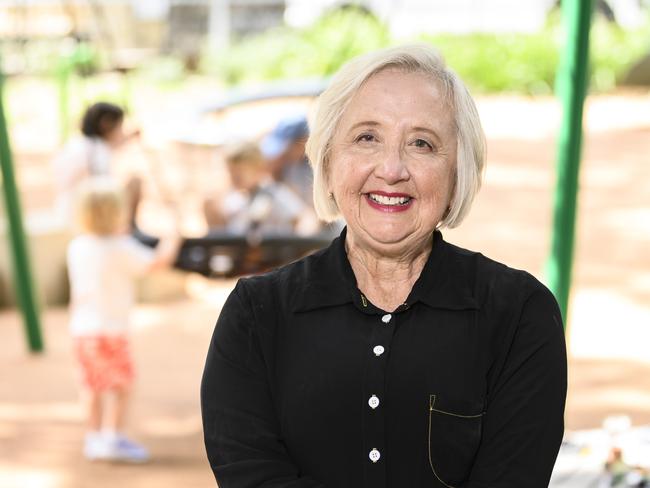
“Why are we asking for all this information and keeping it for so long?”
Ms Hollonds is one of a number of prominent Australian child advocates calling for better awareness and the government to be more proactive with tougher laws.
She said she wants children to have the right ‘to be forgotten’, to be allowed to wipe all digital traces of themselves from the internet before they turn 18.
She said children are too young to understand what they are consenting to when they go online – and sometimes it’s their parents that are giving up their personal information.
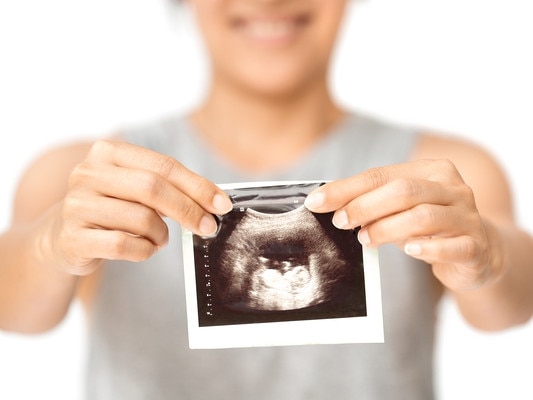
Investigations have found kids’ data is even being harvested while they’re still in the womb, if the mum uses a pregnancy app or if the unborn baby’s ultrasound scan has been shared on social media.
Once a child is born, location data can be collected from baby monitors and smart educational toys that use facial recognition and artificial intelligence to watch and learn from the child.
As they get older, some family location apps – which parents use with their child’s safety in mind – sell live location data to advertisers.
Dr Rys Farthing from Reset Australia, which works to raise awareness and advocate for better policy to address digital threats, said “children’s data is exploited by default across Australia”.
“There’s no meaningful way young people or parents can escape the excessive collection and misuse of their data,” Dr Farthing said.
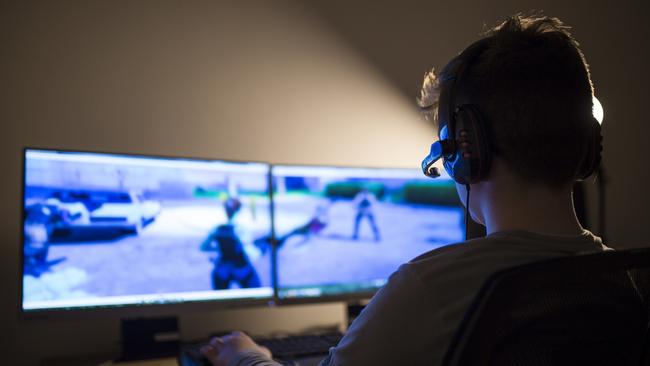
“We’ve left young people wide open to daily violations of their privacy.
“We really need to look again at the way Australia protects children’s data, to curb the worst excesses of a business model that sees young people’s rights as a commodity to steal, sell and profit from.”
The eSafety Commission, which was set up to protect people from online harm, said paedophiles and criminals are also reaching children through technology, such as video game chat rooms, or by piecing together online data.
Before hitting ‘share’ on a photo or a video of your child this summer holiday, parents should take a moment to assess how far that content might spread, eSafety Commissioner Julie Inman Grant said.
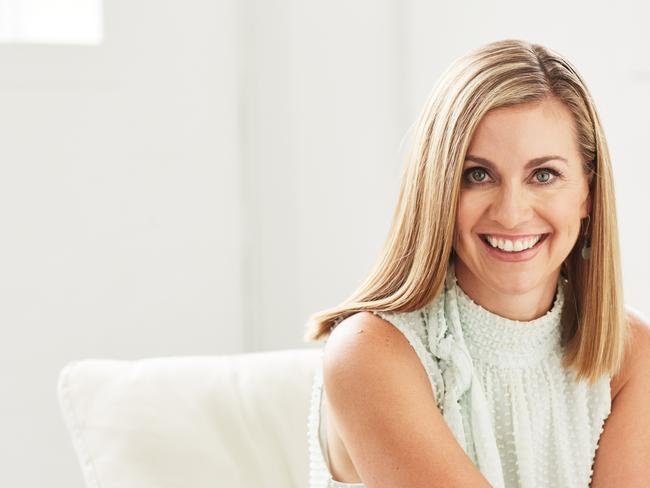
She said innocent snaps of kids may be ‘harvested’ from social media or other websites and used for criminal purposes.
“In the worst cases, these photos can end up on paedophile websites and forums,” Ms Inman Grant said.
“While it’s a horrifying thought that a photo of a child kicking a soccer ball can be used for evil, it’s a tragic reality we’re facing as a global community.”
A growing number of parents, including celebrity mums such as actor Nicole Kidman, singer Dannii Minogue and models Jesinta Franklin and Miranda Kerr, have decided not to post photos of their children on their social media platforms or if they do, their faces are not shown.

PR guru Roxy Jacenko has taken a different approach with her children Pixie and Hunter Curtis, who have their own Instagram accounts, to promote an online retail site Pixie’s Pix, as well as a hair accessory range, Pixie’s Bows.
Ms Jacenko said what is posted was 100 per cent collaborative.
“If the kids don’t want things posted then we don’t post,” Ms Jacenko said.
“Instagram for us is primarily a sales and marketing tool for our businesses.”
She said her parenting choices have been judged in the past, but she said if the kids decided they didn’t want to post on social media anymore, they would close their accounts.
“But for now they love looking back at memories and experiences as they grow up,” she said.
Attorney-General Mark Dreyfus is currently considering recommendations regarding greater privacy protections for children as part of a review of the Privacy Act 1988.
His spokesman said in the meantime the new government had taken steps to improve the “outdated privacy laws” by increasing penalties for serious or repeated privacy breaches and boosting the powers of the Australian Information Commissioner.
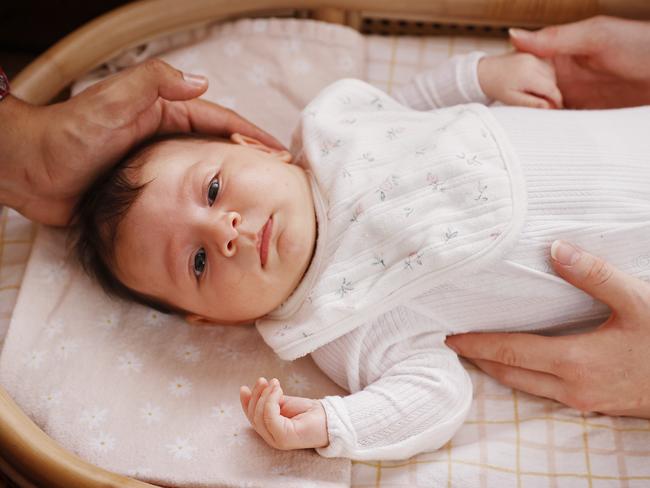
Plan to protect little Gigi
When first-time parents Miguel and Karley Hernandez brought their daughter Gigi into the world in November last year, they knew her upbringing would be quite contrary to their own.
Unlike her millennial parents, the one-month-old will naturally be a digital native who faces the prospect of having millions of her personal data stored online before her teenage years.
While this number may be difficult to avoid due to our dependency on the internet, Gigi’s parents have implemented a plan to safeguard their daughter from the uncertainty of online information sharing.
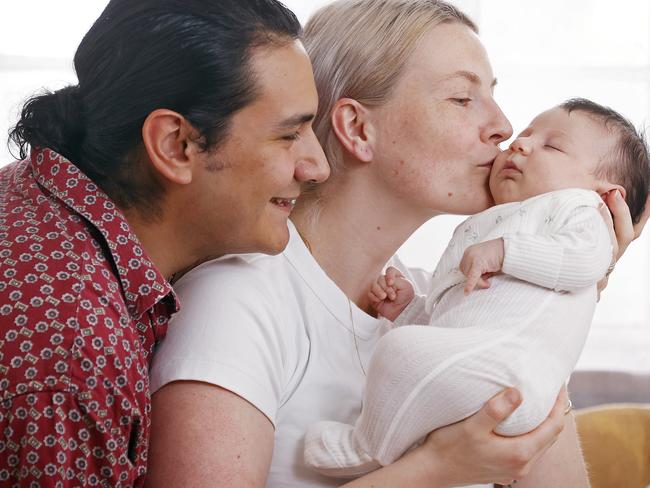
“We’re looking into educating her about the dangers of the internet but at the same time monitoring and introducing the internet with a dosage,” Mr Hernandez said.
The Sydney father has first-hand experience with almost falling victim to scams and as a result learned the value of not oversharing.
“I feel like we no longer pick what we want to consume and it’s pretty funny how you can talk about something and then your cookies take care of feeding you what you need,” he said.
While Gigi’s parents are on guard about their daughter’s internet usage growing up, they still believe there’s a number of benefits she can gain from using technology in moderation.
“All the information is at her fingertips and if she ever wants to know something, all she has to do is pull out her phone and look it up,” Ms Hernandez said.
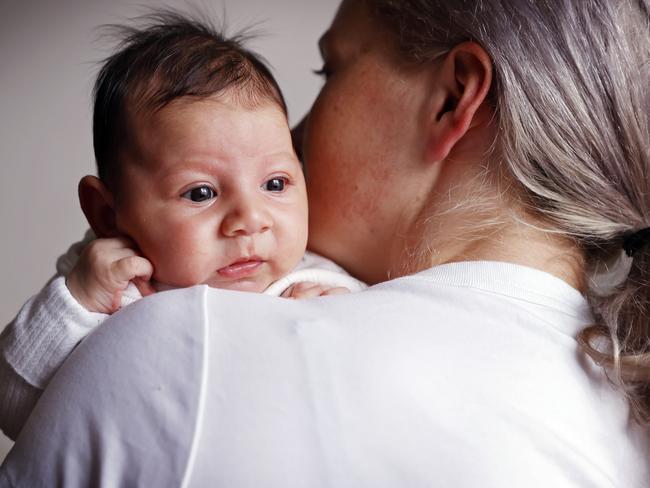
The mother-of-one will do her best to limit Gigi’s access to smart devices for as long as she can, admitting that once her daughter reaches a stage of independence, she’ll be allowed to have a phone.
“When she’s old enough to catch a bus by herself, or when she is at the age where she wants to go to a friend’s house, I think I’ll give her a phone more for security purposes,” she said.
Meanwhile, Mr Hernandez added he wanted his daughter to see the digital space as an option opposed to a necessity.
“We want her to appreciate technology and her rights to something like privacy, because (these days) we take it for granted and we just give it away,” he said.
More Coverage
Originally published as Parents urged not to overshare on social media to protect kids’ privacy




